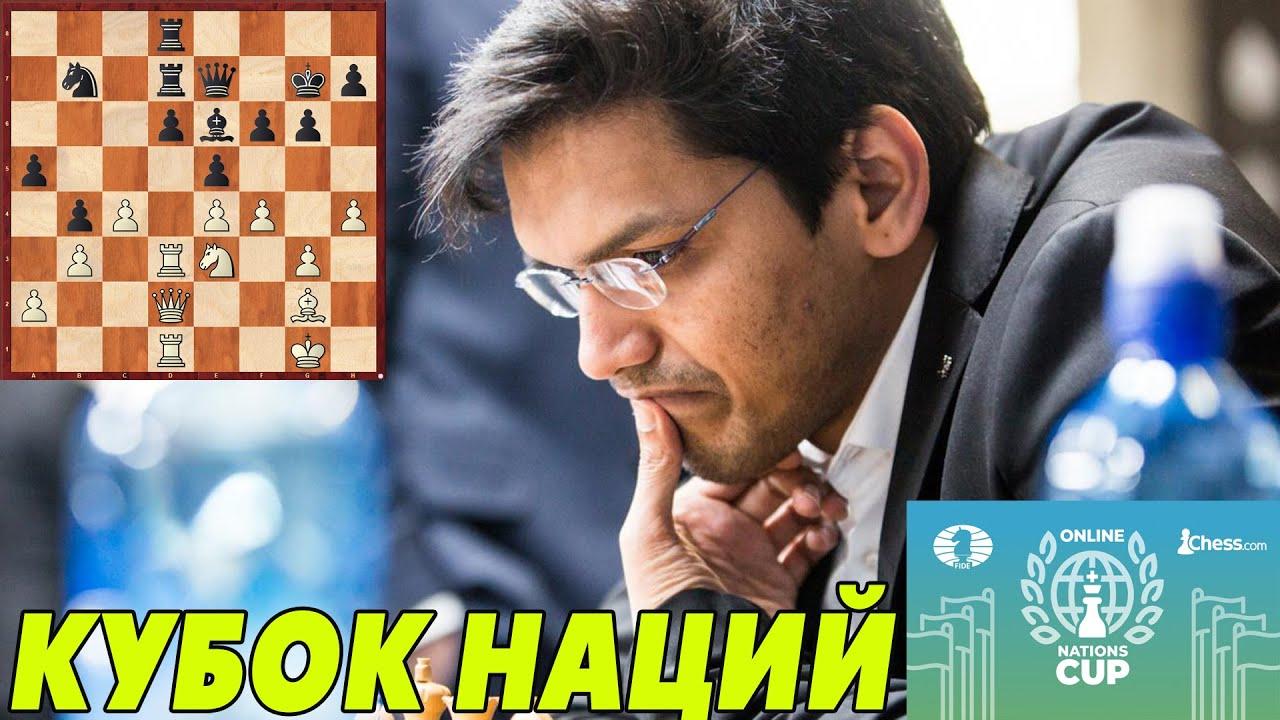
Online Nations Cup - Pandemic Chess
Content
In the previous issue of Young Technician, I wrote about the Candidates Tournament, which was supposed to choose an opponent for the Norwegian Magnus Carlsen in the game for the world title, but was interrupted halfway through due to the rapid spread of the SARS-CoV-2 virus in the world. Every day, more than a million people watched games in Yekaterinburg live through the FIDE channel of the International Chess Federation and chess portals.
Due to the COVID-19 pandemic, sports life in some disciplines has moved online. Online chess have experienced tremendous growth in recent weeks. Since the beginning of the pandemic, about 16 million games have been played online every day, of which 9 million have been played on the world's most popular chess platform, Chess.com.
The only, albeit very important, brake on the organization of such events on the Internet is the potential threat from scammers who support their game at home with the help of computer programs.
Online Cup of Nations () is a team tournament that took place from 5 to 10 May 2020 on Chess.com, the leading chess platform (1). Chess. com at the same time internet chess server, internet forum and social networking site. The FIDE International Chess Federation acted as a co-organizer and patron of this chess event. The tournament was streamed live on multiple platforms including FIDE and Chess.com.
1. Online Nations Cup Logo
This grandiose chess event was followed by several million people around the world, and expert commentaries were conducted in many languages, incl. in English, Spanish, Russian, Chinese, French, German, Portuguese, Italian, Turkish and Polish.
Six teams took part in the competition: Russia, USA, Europe, China, India and the Rest of the World.
The first stage of the Tournament was a double ring, where each team met each other twice. In the second stage, the two best teams played a "super final" against each other. All matches were played on four boards: men played on three, women played on the fourth. Each player had 25 minutes to play, and the clock added another 10 seconds after each move.
2. World champion Garry Kasparov against IBM Deep Blue in 1997, source: www.wired.com
The European team, headed by the legendary Russian Garry Kasparov (2), was played by the representative of Poland - Jan Krzysztof Duda (3). Considered by many to be the best chess player in history (he had the highest ranking in the world for 57 months), Kasparov, 255, officially retired in 2005 but later competed sporadically, most recently in 2017.
3. Grandmaster Jan-Krzysztof Duda in the European team, photo: Facebook
Many top players have played in Nations Cup Online, from 4-year-old former world champion Viswanathan Anand, who is still one of the best chess players in the world, to the latest chess phenomenon, 2658-year-old Iranian Alireza Firouzja. (2560). The best chess players of the world also played, incl. Chinese Hou Yifan is a former four-time world champion, the leader of the women's world ranking (XNUMX), currently a student at Oxford University and (XNUMX ranking). Interested in information about the best Chinese chess players and the last match for the women's world championship (Ju Wenjun -).
4. Archimist Alireza Firouzja, photo. Maria Emelyanova/Chess.com
Here are the lineups:
- Europe (Maxim Vachier Lagrave, Levon Aronian, Anish Giri, Anna Muzychuk, Jan-Krzysztof Duda, Nana Dzagnidze, Captain Garry Kasparov)
- China (Ding Lizhen, Wang Hao, Wei Yi, Hou Ifan, Yu Yan'i, Jui Wenjun, Captain E Jiangquan)
- USA (Fabiano Caruana, Hikaru Nakamura, Wesley So, Irina Krush, Lennier Dominguez Perez, Anna Zatonskikh, Captain John Donaldson)
- Indie (Viswanathan Anand, Vidit Gujrati, Pentala Harikrishna, Hampi Koneru, Adhiban Baskaran, Harika Dronavali, Captain Vladimir Kramnik)
- Russia (Ian Nepomniachtchi, Vladislav Artemyev, Sergey Karyakin, Alexandra Goryachkina, Dmitry Andreikin, Olga Girya, Captain Alexander Motylev)
- The rest of the world (Timur Radjabov, Alireza Firouzja, Bassem Amin, Maria Muzychuk, Jorge Kori, Dinara Saduakasova, captain of the FIDE President Arkady Dvorkovich).
After 9 rounds, the Chinese team secured the superfinal, while teams from Europe and the USA competed for the second place.
In the last, 10th round of the first stage of the Nations Cup in online chess, the European team (5) met with the Rest of the World team. In this match, 22-year-old Polish grandmaster Jan-Krzysztof Duda defeated the best African chess player in history, 31-year-old Egyptian Bassem Amin. It was the third victory for the Pole in the Online Nations Cup, with two draws and only one loss. Unfortunately, the whole match ended in a draw (2:2). At that time, the US team, playing with the Chinese team, did not miss their chance and won 2,5:1,5. With an equal number of match points (13 each), the USA overtook Europe by half a point (total number of points scored in all games: 22:21,5) and advanced to the superfinal.
5. European Team in the Online Nations Cup, FIDE source.
Here is the course of the game Jan-Krzysztof Duda - Bassem Amin, played on May 9, 2020 in the 10th round:
1.e4 e5 2.Sf3 Sc6 3.Gb5 a6 4.Ga4 Sf6 5.OO Ge7 6.d3 d6 7.c4 OO 8.h3 Sd7 9.Ge3 Gf6 10.Sc3 Sd4 11.Sd5 Sc5 12.G:d4 e :d4 13.b4 S:a4 14.H:a4 c6 15.Sf4 Gd7 16.Hb3 g6 17.Se2 Hb6 18.Wfc1 Ge6 19.Sf4 Gd7 20.Wab1 Gg7 21.Se2 Ge6 22.Hb2 Ha7 23.c5 Wad8 24.a4 Wfe8 25.Ha3 Gc8 26.c:d6 Hb8 27.b5 a:b5 28.a:b5 H:d6 29.H:d6 W:d6 30.G:c6 b:c6 31.Wb6 Gd7 32. Sd2 f5 33.Wb7 Gc8 34.Wa7 (diagram 6) 34...Gh6? (e.g. 34…Rd7 was better) 35.f4 f:e4 36.S:e4 (diagram 7) 36… P: e4? (wrong exchange sacrifice, should have played 36… Rde6) 37.d: e4 d3 38.Wa8 d: e2 39.W: c8 + Kg7 40.We1 G: f4 41.Kf2 h5 42.K: e2 g5 43.Wd1 Re6 44.Wd7 + Kf6 45.Kd3 h4 46. Wf8 + Kg6 47.Wff7 c5 48.Wg7 + Kf6 49.Wh7 Kg6 50.Wdg7 + Kf6 51.Wh6 + Ke5 52.W:e6+K:e6 53.Wg6+1-0.
6. Jan-Krzysztof Duda vs. Bass Amin, position after 34. Wa7
7. Jan-Krzysztof Duda vs. Bass Amin, position after 36.S: e4
Match points: Teams get 2 points for a win and 1 point for a draw. and 0 points for losing. In the case of the same number of match points, the auxiliary scoring was decisive - the sum of the points of all players.
Superfinal
In the super final, the Chinese team drew 2:2 with the United States, but thanks to the first place in the first stage, they became the winner of the Online Nations Cup. The games played could be followed on the Internet with expert commentary in many languages, including Polish.
The event was organized by the International Chess Federation (FIDE) and chess.com. The prize fund amounted to 180 thousand. dollars: the winners received $48, the USA team received $36, and the rest of the teams received $24.
fair play procedure
To ensure that the principle of "fair play" was observed throughout the tournament, the players were observed during the game by FIDE-appointed international referees via videoconference. Surveillance included, but was not limited to, webcams, computer screens, and game rooms to ensure participants did not receive any external computer assistance.
The Fair Play Commission and the Appeals Panel were made up of members of the FIDE Fair Play Commission, Chess.com fair play experts, information technology specialists, statisticians and grandmasters. The Fair Play Commission retained the right to disqualify any player suspected of violating the rules of fair play during a tournament.
About the online Nations Cup, Arkady Dvorkovich, President of the International Chess Federation FIDE, said: "."
8. Chinese winning team, FIDE source.
50 years after the chess match of the century of the USSR - "The rest of the world"
Online Cup of Nations - this epoch-making event was somewhat reminiscent of the famous game of the USSR - "The Rest of the World", which took place in 1970 in Belgrade. This was the period of Soviet dominance in chess and the time when Bobby Fischer experienced the biggest boom of his career. The idea of organizing such a meeting belonged to the former world champion Max Euwe. From 1970 to 1980, Euwe was President of the FIDE International Chess Federation.
The games were played on ten chessboards and included 4 rounds. Despite the fact that the then and four former world champions played for the USSR national team, and the composition of the Rest of the World team was much more modest, the match ended in a minimal victory for the Soviet team 20½-19½. . Almost 30-year-old Fischer was then the best in the Rest of the World team, he won two of the four matches with Petrosyan and drew two (9).
9. The famous game of the USSR - "The Rest of the World" played in 1970, the part of Bobby Fischer (right) - Tigran Petrosyan, photo: Vasily Egorov, TASS
The results of the USSR match - "The rest of the world" 20,5:19,5
- Boris Spassky - Bent Larsen (Denmark) 1,5:1,5 Leonid Stein - Bent Larsen 0:1
- Tigran Petrosyan — Robert Fisher (USA) 1:3
- Viktor Korchnoi - Lajos Portisch (Hungary) 1,5:2,5
- Lev Polugaevsky - Vlastimil Gort (Czechoslovakia) 1,5:2,5
- Efim Geller - Svetozar Gligoric (Yugoslavia) 2,5:1,5
- Vasily Smyslov - Samuel Reshevsky (USA) 1,5:1,5 Vasily Smyslov - Fridrik Olafsson (Iceland) 1:0
- Mark Taimanov - Wolfgang Ullmann (North Dakota) 2,5:1,5
- Mikhail Botvinnik - Milan Matulovic (Yugoslavia) 2,5: 1,5
- Mikhail Tal 2:2 – Miguel Naidorf (Argentina)
- Paul Keres - Borislav Ivkov (Yugoslavia) 3: 1
Fischer agreed to play on the second board of the Rest of the World team, as the Danish grandmaster Bent Larsen had given an ultimatum that either He (Larsen) would play on the first board or not play at all. A year later, in the Candidates Match, Fischer defeated Larsen 6-0, making it clear who was the better chess player (10). Then Fischer defeated Petrosyan (6,5:2,5), and then in Reykjavik with Spassky and became the 11th world champion. Thus, he broke the hegemony of Soviet grandmasters and became the number one chess player in the world.
10. Bobby Fisher - Bent Larsen, Denver, 1971, source: www.echecs-photos.be
See also:

